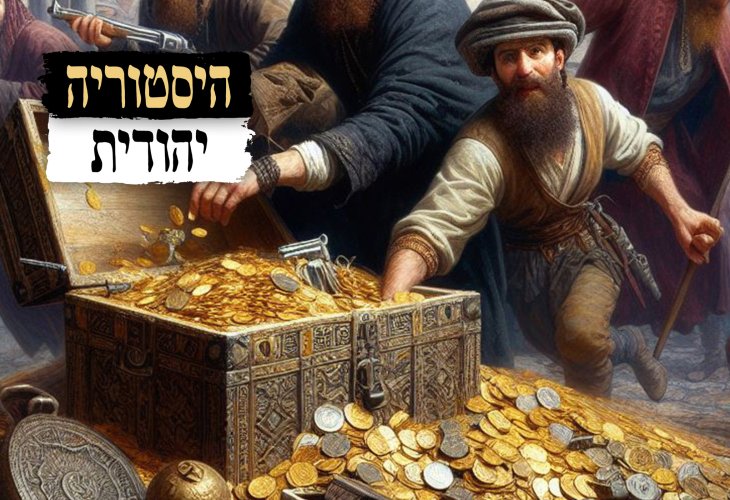Guardians of the Temple Gold: A Saga of Intrigue and Faith
Through clever strategies, loyal priests and leaders protected the temple treasures from rulers and marauders, until the Temple's tragic destruction when Romans seized it all.

This week's Torah portion describes the vast amounts of gold required for constructing the Tabernacle, its vessels, and even the gold-plated wooden boards. It's hard to imagine such a large quantity of gold—for a structure ten cubits high entirely covered in gold.
In the Tabernacle, and later in the Temple, immense golden treasures accumulated, generously donated by the Israelites across generations. They offered their half-shekel contributions with dedication, along with various gifts pledged to the sacred Temple. These treasures stirred the imaginations of rulers and thieves throughout history.
Immediately after King Solomon's passing, his son Rehoboam ascended the throne. Shishak, King of Egypt, noticed the vulnerability in the Kingdom of Judah, which had just had a fallout with the Kingdom of Israel. Shishak, along with Libyan, Kushite, and Sukkim soldiers, marched on Judah's cities. When he reached Jerusalem, the prophet Shemaiah gathered Rehoboam and the leaders of Judah, admonishing them for losing heart instead of seeking refuge in prayer to Hashem. They repented, and Shishak agreed to leave Jerusalem, but not before seizing part of the gold: "the gold shields made by Solomon" and other Temple treasures. Eventually, Shishak returned to Egypt and inscribed the spoils he plundered from Jerusalem, including the Temple, on the walls of his temple in Karnak.
Centuries later, during the days of Hezekiah, Rehoboam's descendant, Sennacherib, King of Assyria, set his sights on the Temple's treasures. In fear, Hezekiah sent him gold doors from the Temple, hoping that would satisfy him and make him leave. But Sennacherib wasn't content and besieged Jerusalem. He wanted everything... The prophet Isaiah bolstered Hezekiah and the Israelites, who strengthened their faith in Hashem. In the middle of the night, an angel struck Sennacherib's army, forcing him to return to his homeland in disgrace.
The Temple eventually fell, and the Babylonians plundered its treasures. Yet, the Israelites had the privilege of returning and rebuilding the Temple, once again gathering substantial wealth from yearly contributions and donations. With Alexander the Great's conquests, including Jerusalem's capture from the Persians, Greek kings lusted after the Temple's riches. Approximately 178 BCE (about ten years before the Maccabean Revolt), King Seleucus IV sent his deputy Heliodorus to enter the Temple in Jerusalem and plunder its treasures. High Priest Onias stood at the court's entrance, pleading with Heliodorus not to commit his vile act, stressing that the Temple was a sacred place and that he would be risking his life by desecrating it.
But Heliodorus pushed Onias aside, entering the Temple alone. As he gazed at the splendor and glitter of gold, the entire hall shook. Heliodorus saw an angel riding a fiery horse charging in. The angel's two attendants struck Heliodorus down, beating him fiercely. Heliodorus began to scream before losing consciousness. Onias, the High Priest, dragged him out to avoid inciting the wrath of the Greek king. Eventually, Heliodorus regained consciousness and shamefully left Jerusalem.
When Judah Maccabee prepared to battle the Greeks, he recounted this story to inspire his troops, reminding them that with Hashem's will, they could conquer the mightiest of foes.
The struggle over the Temple treasures continued for years. Even until its eventual destruction, both foreign and Jewish leaders repeatedly sought to fill their coffers with its coins. The Sadducees, aiming to secure funds for their palaces through the half-shekel offerings, got a definitive response from the priests: the obligatory purchase of the daily sacrifices was through the half-shekel, ensuring the offerings qualified as community sacrifices. According to Jewish law, they had to be bought "from the public." In response, the Sadducees argued that an individual should be allowed to donate to the community, promising that the money would be entrusted to their reliable hands, and they would generously cover the community sacrifices' costs...
The Pharisees and faithful priests repeatedly used cunning and wisdom to prevent rulers from seizing the treasures, until the decree for the Temple's destruction was issued, and the ruthless Romans plundered all its treasures.

